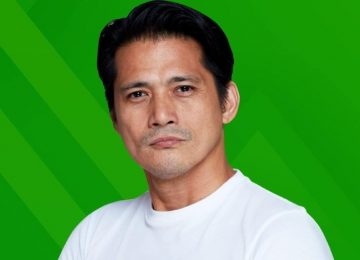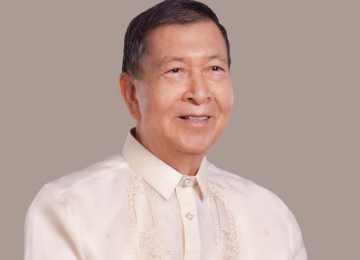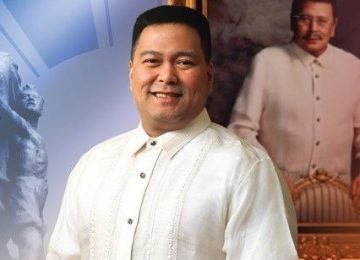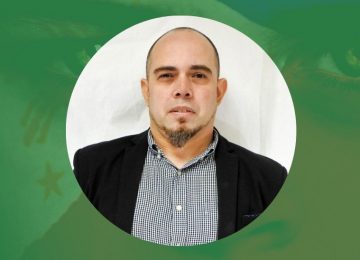Carmen Zubiaga is a consultant and advocate for gender equality, disability and social inclusion. She was the president and chief executive officer of Women with Disabilities Leap to Social and Economic Progress or WOW-LEAP.
On social media, she simply describes herself as “a woman in a wheelchair advocating for change and inclusion of persons with disabilities in a rights-based society.” Zubiaga also served as acting executive director of the National Council on Disability Affairs from 2012 to 2019.
She says she is running for senator and not a party-list representative because disability is an intersectional issue. All laws, according to Zubiaga, should be inclusive and proactive in addressing concerns and problems of not only PWDs but also people who may become disabled due to old age.
Zubiaga is campaigning on a platform of inclusive governance which she says would involve rooting our corruption and under-the-table transactions. Her advocacy also entails educating families about various disabilities, increasing the accessibility of services and products, and creating a safe space for all to participate and enjoy.
Ang mga batas ay kinakailangan natin na maging inclusive at ito dapat ay tumutugon sa mga pangangailangan ng mga pamilya at mga taong may kapansanan. Dahil alam natin na ang kapansanan ay isa sa pinakamalawak na sektor na hindi naiintindihan ng ating publiko.”
CARMEN REYES ZUBIAGA
Full Name: Carmen Reyes Zubiaga
Birthday: July 16, 1958 (Age 67)
Birthplace: Taytay, Rizal
Residence: Taytay, Rizal
Languages Spoken: Filipino, English
Parents:
– Teodorico Zubiaga, father
– Anastacia Zubiaga, mother
Siblings:
– Eight siblings
Spouse: Dennis Zubiaga
Children:
– Jose Zubiaga
– Moses Zubiaga
– Joanna Zubiaga
– Gabriel Aaron Zubiaga
Profession/Occupation: Disability Consultant
EDUCATION
- Master’s Degree in Development Management, Asian Institute of Management, 1993
- Bachelor of Arts in Mass Communication, Trinity University of Asia
WORK EXPERIENCE
- Consultant on Gender, Equality, Disability, and Social Inclusion, 2019-present
- Acting Executive Director, National Council on Disability Affair, 2012-2019
- Public Information Officer, Gender-Equality-Disability Focal Person and Social Welfare Officer, Taytay, Rizal, 2004-2012
- President and Chief Executive Officer, Women with Disabilities Leap to Social and Economic Progress, 2000 – 2004
- Technical Adviser, National Center for the Disabled, Ministry of Social Affairs, Cambodia (through the UN Volunteer Program), 1996-1999
MAJOR ACCOMPLISHMENTS
Public Office
From 2012 to 2019, Zubiaga was the acting executive director of the National Council on Disability Affairs, the agency mandated to lead in policy formulation, program development and monitoring of all disability related activities in coordination with national government agencies, local government units, non-government organizations and organizations of persons with disabilities.
Private Sector
Zubiaga is a veteran disability consultant and advocate. She is a polio survivor, with both of her legs affected by paralysis, resulting in her use of a wheelchair.
For Carmen Reyes-Zubiaga, Apolinario Mabini did more than planting the seeds for the Malolos Constitution (the first in Filipino history), serving as the first foreign affairs secretary of the country, and being former-Pres. Emilio Aguinaldo’s right-hand man.
For her, the national hero is also her inspiration.
“People are helping him because people know he is a valuable person. People will learn to value a person because of what they can contribute,” Zubiaga told Yahoo! Philippines in a virtual interview.
Calling the late hero a “sublime paralytic” would be an insult for Zubiaga. Instead, she found Mabini’s more popular nickname fitting of his image: the brains of the revolution.
Like her idol, Zubiaga is a person with disability (PWD) struggling with poliomyelitis. The viral disease attacks an individual’s spinal cord, and can disable a person as a result. Polio case numbers may have dropped drastically over the years, but Zubiaga is now one of the handful living with the long term side-effects.
In her case, Zubianga dealt with it from the age of one, with her recalling that “[she] never wanted [her] disability to be the reason for people not to inform [her nor] to dislike [her]. They have to see [her] other qualities as a person.”
Zubiaga fought to have the voices of Filipino women, children, and PWDs heard for over 35 years, from joining advocacy groups to dedicating eight years of her life to public service. Now, Zubiaga is one of the 63 candidates vying for a senatorial seat in the 2022 national elections, hoping to continue her battle for “inclusive governance.”
For Zubiaga, “disability is a cross-cutting issue” that “cuts across all sectors.” The lack of rehabilitation programs for PWDs, mental health programs, training for public awareness, and inclusive employment, per Zubiaga, put Filipinos, especially the youth, at risk.
“Most [people] think disability is always visible but they don’t think that there are four non-visible disabilities, which may be haunting our youth,” she worried. “[…] [If] we don’t guide our youth properly in [an early] stage of life, then we are wasting half of the youth population. It is important for us to establish facilities where youth can have counseling activities, can develop themselves, can define themselves, and help each other.”
Even with the support of her friends, Zubiaga realized that the environment then held her back. So much so that the disability social consultant was later unable to attend classes for about 10 years, and was only able to return to them at the age of 24.
“That was the real struggle where I really experienced all the hardship[s] and all the barriers [that] prevented people with disability to achieve or to do what [her and other PWDs] wanted but I was so persistent,” she shared.
The advocate would eventually graduate from Trinity College of Quezon City with a Bachelor’s degree in Mass Communication. Before this, she took the Philippine Educational Placement Test (PEPT), designed to assess the skills of homeschooled and out-of-school youth, in 1983. Her passing the exam accelerated her from first year high school to first year college.
Although she claimed to be a non-religious person, Zubiaga was thankful to have a “supreme being” to help her gain scholarships in her undergrad and postgrad days.
“I studied in good schools [even if] we don’t have money. I got all the support I needed. I studied in [a] Masters school. [It was a] very expensive one no poor [person] can afford, but I went there. All the prestigious schools I attended, [they are] all for free and they paid me to study. I think that is all God’s blessing[s] and [they] prepared me for a bigger role in life,” she reminisced.
On how she hoped to end the stigma in her own way, Zubiaga recalled her interactions with jeepney drivers and passengers back when she studied for her Masters degree in Development Management at the Asian Institute of Management. Having them help Zubiaga would, in practice, “educate” them.
“I told my friends, as I used to work in Tahanang Walang Hagdanan (lit. ‘A Home Without Stairs’ in English), ‘[…] you can take the jeepney, and go to [a] crossing, and take the jeepney again, and [the drivers and passengers] are very helpful.’ That was the beginning when jeepney drivers became familiar with [the PWDs] and when they see people in wheelchair[s], they will instantly help and know what to do,” she continued.
However, she would face discrimination in accessing buildings, transportation, and livelihood. In her words, “it came to a point that we feel [that] we cannot accomplish anything, even if I’m working with a government agency, unless we go to a higher level, such as the highest policy making body which is the senate.”
After a failed attempt to start her own partylist, Zubiaga found that “the best place to advocate policy reform for the marginalized” is the senate itself. So, she decided to campaign for a seat at the table.
“If any party will pick up my advocacy, I will promote that party or any group that will pick up my advocacy, [I] will support. My personal choice of candidates has nothing to do with my candidacy because my candidacy is dedicated to [the] person with disability sector and we all agree [that] whoever your candidate is, let us support our journey to the senate [sic],” Zubiaga said, regarding her choice to be an independent candidate.
For the people, by the people
Since 1987, Zubiaga advocated for PWD welfare and gender equality, and has worked in different positions with non-government organizations (NGOs) such as the aforementioned Tahanang Walang Hagdanan, Inc. in doing so. She also worked with Women with Disabilities LEAP to Social and Economic Progress (WOW LEAP Inc.), where she served as president and chief executive officer from 2000 to 2004.
It was also in 2004 when she had her first foray into politics. Serving as the public information officer, social welfare officer, and gender and development focal person of her hometown Taytay, Rizal’s municipality, Zubiaga would hold onto these positions up until 2012. Although remembering how people deemed her work “demeaning” due to the hectic workload that was more geared for higher positions, Zubiaga saw this as a learning experience.
She saw how people “were not assertive of their right to decision-making” and how certain civil society organizations (CSOs) and Community Health Officers (CHOs) did not provide concrete programs.
“[…] A multi-sectoral group should be composed of people who know what local governance is. They should teach the local people that local officials owe them their position[s] and no official should [feel] entitled. They have to fulfill their role as public servants. That is what I am bringing now because a local official knows how to play with people. That is why we don’t get the real progress we want,” Zubiaga lamented.
This was when she introduced “inclusive governance:” the complete involvement and representation of people across different sectors in decision-making.
“All levels of geographic areas have certain sectors which are marginalized like IPs [indigenous people], informal settlers, informal workers, marginalized fishermen, and farmers. All of them should be included in governance as each of them [are] playing [big roles] in the community like food, labor, and everything [else] they do, which forms [sic] a part in building a strong community […],” she explained.
On her stances and platforms
Bound to the concept of inclusive governance, Zubiaga eyes a progressive Philippines that recognizes the rights and welfare of PWDs, women, and members of the LGBTQIA+ community among other sectors.
One of her plans involved reforming the “Incentive Mechanism for Employers.” Zubiaga, said that employers working with PWDs, under Section 8. of the Magna Carta for Disabled Persons, would be given a tax rebate of 50% if they are eyeing to renovate and make a workplace more accessible. Another 25% would also be deducted from employers’ due taxes to cover the salaries and wages of the PWDs.
However, Zubiaga saw little efforts to avail the incentives, saying that “we really have to come up with [an] incentive mechanism as that is also stated in the law, but until now wala pang (there are no) incentive mechanism[s] na nabubuo (made) for employers employing persons with disability, older persons, yung mga (those) summer programs for youth, so hindi yan i-lilimit sa (these won’t be limited to) persons with disability. It should be for all marginalized sectors.”
She then continued with her hopes for a Family Protection and Security Act. Planning for families with disabled children (aged from newborn to 18) to receive financial support, Zubiaga also eyed for same sex couples and older family members to gain health and education benefits to ensure that families live “cohesively.”
“We believe that family, as the basic unit of society, should be healthy, inclusive, [accepting of] each other, and should not think of any child as a burden. No parent or sibling should suffer to take care of a family member that has disability or no children should be left behind because they are children of same sex couples. We have to see to it that every family is happy and protected and supported,” Zubiaga explained.
On same sex marriage, Zubiaga clarified that she is more for recognizing civil union due to the religious nature of marriage. She maintained that it is a matter of “protecting” and “respecting” the rights of same sex couples to adopt children and to decide on other desired “living arrangements,” including benefits detailed in her plans for a Family Protection and Security Act.
“[…] religion is a personal choice as well, and we cannot impose on others our own beliefs and religion, but we have the responsibility to protect our brothers and sisters, and that is one way of telling them that I care and I want to protect you. That’s all I want them to understand,” Zubiaga added.
Her support for the LGBTQIA+ community extends to her call to junk the Visiting Forces Agreement (VFA). This referred to a set of legal guidelines detailing how United States (US) military and personnel can operate in the Philippines, and became a major talking point in the 2014 murder of transwoman Jennifer Laude at the hands of pardoned marine Joseph Scott Pemberton.
Recalling the crime, Zubiaga slammed the inefficient legal proceedings when it came to the VFA and called to hold the Department of Justice (DOJ) accountable.
“The justice system is not enough. Maybe the policy is there, but the type of people we employ or that compose the justice system may not be the right people to be there. […] If our justice system is enough then there will be no abuses and no injustices,” Zubiaga blasted, calling to rally behind demands for optional protocols related to human rights, “which [Filipinos] signed as a state.”
Still committed to her vision of “inclusive governance,” Zubiaga would first like to hear both sides of the story, pushing for a “substantial discussion” to determine if the problem really is the VFA or the people meant to enforce it.
“You know, kasi (it’s because) we [are] used to [hearing] statements from the trapos, from people who think what they say is always correct,” Zubiaga joked. Short for “traditional politician,” a trapo often refers to a corrupt individual willing to do anything for votes.
The national government passed the Responsible Parenthood and Reproductive Health Act of 2012 (simply known as the RH Law). It is here that concerned individuals would be given access to medically-proven and affordable contraceptives. Despite this, abortion is still illegal and, for the most part, frowned upon by the predominantly religious Filipino people.
Zubiaga affirmed that she is for decriminalizing abortion. However, she added that it must only be done in medically urgent cases, such as if a mother may die upon giving birth and/or if their child/ren may perish upon being born.
“We do not like to create a community of guilty women because there has been a research done that most women who have done abortion feel guilty all their lives, and some of them could not survive and got mental breakdown and we will not like to create another misery for our women,” Zubiaga recalled, with some parts of a 2017 testimony compilation by the BBC echoing her sentiments.
The disability social consultant said that those seeking to simply evade responsibility will be held accountable, adding that the state must aid women impregnated through rape.
In the event that the mother is unwilling to take care of the child, Zubiaga said that adoption can be the “last resort.” Promising to review the Family Code of the Philippines, the advocate also aims to ease the local adoption process, saying that “sila na nga mag-aadopt, sila pa nahihirapan (there are those adopting and yet they are the ones burdened).”
Finally, on the matter of divorce, Zubiaga criticized how limiting annulment was for couples looking to separate. According to her, there was only one ground needed to annul a marriage: “psychological incapacity.”
“I think if we have to use annulment, to amend annulment, it should be made easily available, but if not, we have to pass another bill for divorce kasi (because) we want it not to be that expensive,” Zubiaga said, explaining that couples must be very sure if they really want to separate.
She also recognized the possible consequences of couples staying together despite no longer being affectionate or committed, saying that “two people who live together, always fighting, what kind of children will they produce? Children who are in the stage of identity crisis and discovering themselves na ganun ang environment nila (that’s their environment).”
True colors shining through
When asked about her preference for violet, Zubiaga enthusiastically said that she wanted to convey that her campaign was founded on noble intentions. For her, the color violet is a symbol of that.
Complementing this was her fondness for the color pink, which she described as being a symbol of love. She said “I love what I’m doing, and I love the people that I’m working for, and I want them also to love themselves because they are worthy of offering noble intentions for.”
However, no amount of love can be found when Zubiaga looked back on outgoing Pres. Rodrigo Duterte’s time. For her, the jokes Duterte cracked in bad taste and his widely televised strongman, foul-mouthed antics left a “values crisis” among the youth.
“‘Pag nakikita nilang tuwang-tuwa ang mga magulang nila ‘pag nagmumura si Duterte, ano iisipin ng mga bata? […] then yung mga statement na nakaka-degrade sa mga women. Hindi lang women, pati fellow kalalakihan niya. I think never again dapat. Never again,” Zubiaga said.
(“When kids see their parents laughing at Duterte’s curses, what will they think? […] then there are his statements that degrade women. Not just the women, but even his fellow men. I think this should never happen again. Never again.”)
At this point, Zubiaga emphasized the importance of guiding the youth at an early age. She believed that focusing towards “values formation” in the first three years of basic education is a must, and daycare and development centers, as well child psychologists and other professionals should do their part in shaping a child’s principles.
“[…] kailangan baby pa lang, gina-guide na, especially sa mga parents ng poor families who cannot afford and lacks [sic] knowledge [in] parenting, kaya I really want every community [to] have early childcare development center[s], dahil diyan talaga natin kailangang magising ang bata sa ganyang environment, and their parents also should learn how to handle them, how to bring them up so pati parents matuto,” Zubiaga continued.
(“[…] they should already be guided while they are still babies, especially for parents of poor families who cannot afford and lack knowledge [in] parenting, which is why I really want every community [to] have early childcare development center[s] because this is where we need children to wake-up to reality, and their parents also should learn how to handle them, how to bring them up so even parents can learn.”)
The recent propaganda attacks on the family of Vice President Leni Robredo (currently running for president also reminded Zubiaga how dirty politics can be.
She said “I really don’t want traditional politics. I really don’t want them to invade my privacy, kaya ako lang ang pumo-pronta. Wala yung family ko at wala naman silang i-aattack sa akin (which is why I’m the only one in the public eye. My family is not involved and the naysayers have nothing to attack me with.”
Around 2012 to 2019, Zubiaga, Robredo, as well as Antonio Gerona, Jr. and Maria Lourdes Gerona (the latter siblings) worked together when Zubiaga served as acting executive director of the National Council on Disability Affairs (NCDA).
Despite the challenges, Zubiaga is more than determined to bring a “new face makeover” to the senate.
“Lagi na lang tayong boboto sa ‘generalists’ na walang alam talaga [sa] anong mangyayari sa atin, so pareho nanamang senado ang papanoorin natin, so let’s have a change naman. Let us listen naman to advocates discussing disability, which is [a] concern of the whole nation,” Zubiaga said, urging voters to be wise and be wary of trapos who only know how to make fools out of the public.
(“We’ve always voted for ‘generalists’ who don’t have a clue about what can happen to us, which is why we always deal with the same type of senate, so let’s have a change this time. Let us listen to advocates discussing disability, which is [a] concern of the whole nation.”)
When compared to nations like Japan and Thailand, Zubiaga lamented how the Philippines lacked leaders who openly discussed their disabilities.
“We had some lawmakers who [have] disabilities, but they do not talk about disability, so ano ba yun? (What’s that all about?) They want to talk about different things. They denied being a person with [a] disability. That is why they cannot share anything about living with disability, because they live a very comfortable life,” Zubiaga slammed, promising to change that.
With her many years of experiences and with her grand plans for the country, Zubiaga invited voters to “think.”
“We all have to think of something that we haven’t thought about for some time and that is looking at your friend, colleague, or anybody you know who has [a] disability. I think it’s time we explore kung ano mga (what are the) difficulties, barriers, deprivations na naexperience (that PWDs experience). At least I am offering for [sic] a better life through responsive policies, rights-placed policies,” Zubiaga promised.
With energetic glee, she ended with an invitation: “Think of Carmen Zubiaga, number 63 sa balota (in the ballots), representing disability, pushing for [an] inclusive society for all.”
Reuben Pio Martinez is a news writer who covers stories on various communities and scientific matters. He regularly tunes-in to local happenings. The views expressed are his own.










